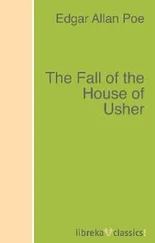Albert, who, by his terror and apprehensions of seeing those ghosts that had so greatly frightened him, was prevented from sleeping, got up the moment day appeared and crept down stairs, here he was soon after joined by Joseph. 'How have you slept, my good friend?' asked he. 'Slept!' replied the other; 'why, who could sleep d'ye think, when chains were rattling, ghosts roaring and groaning doors banging with violence enough to shake the foundation of the walls? Lord help me, I would not live in such a place no, not to be master of the whole estate.' 'Aye, I knew how it would be,' said Joseph; 'it's always the same business when any body comes here to sleep; we never hear any noise else.' 'Why, then your ghosts are very rude unsociable folks,' answered Albert, 'for strangers can do them no hurt, and there's room enough, me thinks, in this great house for them to have their merriments, without coming to frighten honest travellers, that never desire to interrupt them.' 'I don't know how it is,' replied Joseph, 'but as to merriment, sure there can be none in groans and cries, and they do say that cruel wicked deeds have been done in this castle, and I suppose the poor souls can't lay quiet.' 'Dear me,' cries Albert, 'I wish my mistress may be well enough to go farther, though poor soul, she doesn't know where to go to, that's true.' 'Poor lady, that's bad indeed; has she no parents, nor husband, nor uncles, nor aunts, nor - ' 'Yes, yes,' said Albert, interrupting him, 'she has some relations, but what of that, better she had none, I believe for her - O, here comes Bertha.' On her entrance the good morrows and enquiries were repeated; Bertha expressed her sorrow for the lady and immediately ascended the stairs to see if she was not frightened out of her wits by such a cruel disturbance.
She soon returned with the lady, and breakfast being quickly set before her, she endeavoured to eat, but her appetite was so indifferent as to cause great pain to the friendly Bertha.
Joseph mounted his favorite beast and repaired to the town that he might procure necessaries for his family, superior to what he had bought the day before. After his departure, and that Albert was gone to look after his horse, the fair stranger demanded of Bertha if she could give her any account of the owners of the castle. 'Why, madam,' answered she, 'the present lord of this estate is - aye, his name is Count Wolfenbach; he married a very handsome lady at Vienna, and brought her here; it was then a beautiful place very unlike such as it be now; but howsomever they say he was very jealous, and behaved very ill to the poor lady, and locked her up, and there she was brought to bed, and the child was taken from her, and so she died, and 'twas said the child died, and so every body believes 'tis their ghosts that make such dismal noises in the castle, for soon after my Lord the Count went away, Joseph who worked under the gardener, was ordered to take care of the house; and I lived then under the cook, so we married: all the other servants were discharged, and so we have lived here ever since. My Lord came here once or twice, but the ghosts made such a noise he could not stay. Several gentry have slept here at times, but no body would stay a second night, and so we have all to ourselves by day, and the ghosts, or what they be, have got all the rooms by night and then they be quiet enough.' 'Pray,' interrogated the lady, 'can I walk through the rooms and examine the opposite wing?' 'To be sure, madam, you can, if you be so bold, but neither I nor Joseph ever goes there, because that's the part where the poor Countess died.' 'How many years ago was it?' 'Near eighteen, my Lady for next Christmas we have been married so many years, and I was fifty-three and Joseph fifty-two when we came together; not very young to be sure, what of that, we live very comfortable, only a little lonely or so.' 'Well,' said her guest, 'I shall be glad to walk through all the apartments.' 'I will attend you, madam, except to the other side, there I never goes.'
After breakfast was over, the lady and Bertha walked up stairs; they went through several fine apartments, the furniture rich though old fashioned; one hung with family portraits she was particularly pleased with; two attracted her attention greatly, which Bertha told her, she had heard say, were the present Count and his late lady.
After going through the body of the house they came to the doors that led to the other wing: 'Now, for goodness sake, dear Madam, don't go no farther, for as sure as you are alive, here the ghosts live, for Joseph says he often sees lights and hears strange things.' 'My good friend,' replied the lady, 'you may return, but I certainly will look into those rooms.' 'O, pray good, your ladyship, don't go now.' She persisted however in her determination, and on Bertha's leaving her she opened the door which led to a gallery, and a handsome stair-case, on the right hand she saw a suite of four rooms, all well furnished, two as bed-rooms, one handsome sitting room, the other a library, well filled with books, in handsome cases; these two last rooms, she observed, exactly fronted the one on the opposite side, where she had slept. Having examined those apartments, she saw, on the other side of the gallery, two other doors; these, on trial, she found locked. She then returned and went down the stair-case; after the first landing place the windows were shut, and when she came to the bottom she entered a hall, in which were three doors; one she attempted to open, immediately a murmuring noise was heard, and the instant she opened the door, another at the end of the room was shut to with great violence. The lady for a moment stood suspended; she trembled, and deliberated whether he should return or not; but recovering resolution, she entered; a candle was burning on a table, the windows were closed up, there were books and implements for drawing on the table; this convinced her the inhabitants were alive, however, and going to the door, she said aloud, 'Whoever resides in this apartment need not be under any apprehensions from the intrusion of an unfortunate woman, whom distress has driven to this castle, and only a melancholy kind of curiosity has induced her to explore a part of it proscribed by every one.'
She had scarcely uttered these words when the door opened, and a lady, attended by an elderly woman, appeared. Both started; but the visitor, in a confused manner, apologized for her intrusion. The other taking her hand, placed her in a chair. 'Perhaps, madam,' said she, 'this may prove the happiest day of my life, and I may rejoice that your curiosity and courage is superior to those terrors by which others have been intimidated.' 'At least, madam, you will do me the justice to believe,' answered the lady, 'that I would not have been guilty of this intrusion, had I known these apartments were really inhabited, but be assured, madam, your secret is perfectly safe with me.' 'I do not doubt it,' replied the other, your countenance is a letter of recommendation to every heart.' She then ordered her attendant to bring some refreshments, which consisted of biscuits and fruits.
The woman being withdrawn, the lady of the house said, 'However, madam, I may rejoice in seeing a female of your appearance, I cannot help lamenting that one so young should know sorrow, or be driven to seek an asylum in such a melancholy place as this castle.' 'I am indeed, madam, an object of pity,' replied the other, 'without friends, a home, or one acquaintance to sooth my sorrows. I have fled from oppression and infamy, unknowing where to direct my steps, or what will become of me.' 'Surely,' said the former lady, 'heaven directed your steps here, that we might communicate comfort to each other: griefs, when divided become less poignant; I have known years of sorrow, yet I still support life in a feeble hope of one day being restored to happiness.' 'Alas!' replied the other, 'not one shadow of hope can I derive from either past or future prospects; and as I have intruded thus upon you, madam, it is but fit you should know who and what I am. I was born, as I have been told, at Fribourg, and lost both my parents in my infancy. My birth was noble, but my fortune very trifling. The first thing I can remember was a gentleman who I was taught to call uncle, an elderly woman his housekeeper, and a young girl attendant on me; we lived in the country, about three miles from any town or village. As I grew up masters were hired to attend me, and by their skill and my own attention, having nothing to divert my mind from my studies, I became tolerably accomplished at twelve years of age, when my masters were discharged. We received no company; a few gentlemen called now and then, but those I never saw. My uncle was exceedingly fond of me; his name was Mr Weimar, mine Matilda Weimar. Our ancestors, he said, had been Counts, and persons of high rank and fortunes, but by war and prodigality, they had been reduced to comparative poverty; therefore it was fortunate for me he had never been married. I think I am naturally affectionate and grateful, yet I never felt any degree of either for my uncle; and, young as I was, have frequently taken myself to task when I found a repugnance to return his caresses. I devoted my whole time to my studies; my uncle, when I was about fifteen having some property in France, was compelled, by the failure of a house, to go there in person; at first he talked of taking me with him, but changed his mind, and gave me in charge to his housekeeper and an old servant called Albert, with strict orders I should never go beyond the walks belonging to his castle. Nothing could exceed the tenderness of his behaviour at parting, and for the first me in my life I was affected I returned his embraces and shed me tears. "Ah ! Matilda," said he, "are you indeed sorry I should leave you?" "I am, indeed," I replied. "Then you shall go with me," cried he, eagerly; but striking his forehead, he exclaimed, "No! that will not do; dear Matilda, my sweet niece, keep yourself retired, apply to your studies, I shall soon return, and, I hope, make you the happiest of women." I felt at that moment real gratitude and affection; I promised strictly to obey his commands, and by my endeavours to improve my mind, deserve his love and esteem. He quitted me with extreme reluctance, and for several days I found the want of his company and conversation, but by degrees I grew reconciled, and as Agatha and Albert were respectable and intelligent persons, for their stations in life; I made them both my friends and companions. This was really the happiest period of my life I was capable of amusing myself with music and drawing, in the evenings I walked in the garden and adjoining wood with Agatha, returned with a good appetite, and slept quietly. My uncle remained in France near nine months, he constantly wrote to me, and I was punctual in my answers; at the end of that period he returned; I was overjoyed to see him, but the pleasure I felt and expressed fell very short of the rapture and transport with which he embraced and praised me; he dwelt on the improvement in my person with such delight, that I felt confused and uneasy; the attention which used to give me pleasure now was painful, and I repulsed his caresses involuntarily. He told me he had brought me a present of some books and drawings, both of which he knew would be acceptable to me; I acknowledged his kindness with an apparent gratitude, yet I was in reality but little thankful, though I could not account for the increasing coldness of my behaviour. After a hasty supper I retired to bed, notwithstanding his wishes to detain me, and after I was alone I began to reflect on my conduct so cold and thankless, towards so kind an uncle, whose affection for me seemed greatly increased. I was displeased with my own reflections, and resolved to behave better to him the following day.
Читать дальше












